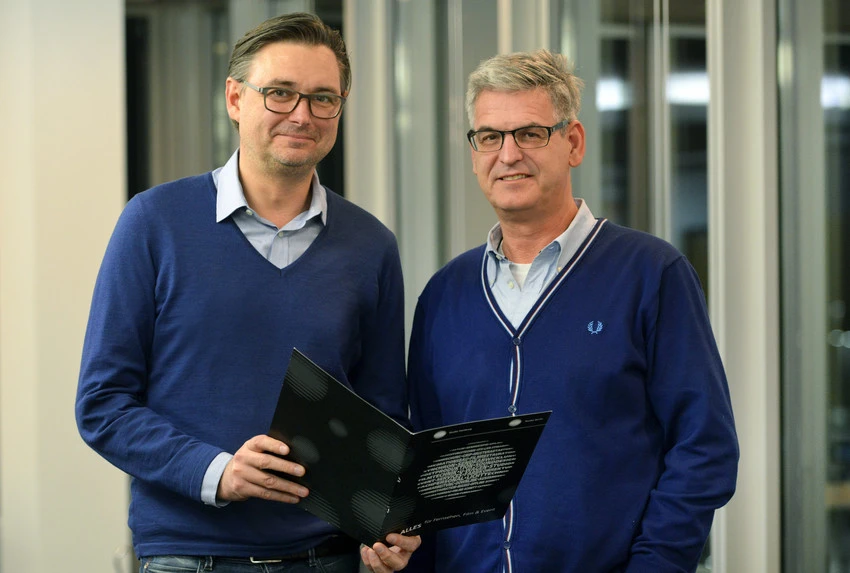Election debates only take place every four years
Interview with Nick Zimmermann and Mike Krüger from Studio Berlin about turbulent times, the digitisation of business and the recovery of companies
The “Kanzlerduell” TV debate, German elections – The past month have surely been eventful. Are you happy with 2017?
Zimmermann: We had a very positive and busy year in a difficult market environment.
Krüger: The “Kanzlerduell” TV debate, the German elections and the numerous other political talk shows automatically lead to increased capacity utilisation. They lead to a higher demand for our capacities. However, the election debates only take place every four years.
You mentioned higher demand for your capacities. What does that mean for you?
Krüger: That the productions we did in 2017 were successful and are being continued. “The Voice of Germany” has a market share of 20%. It has considerable appeal when the hosts of the show welcome their audience with the words “live from Berlin”. Our large studios are constantly used to capacity due to “The Voice of Germany”, “The Voice Kids”, “Klein gegen Groß”, “Der Quiz-Champion” and, of course, “Mario Barth”. In the political talk show category, we are responsible for broadcasting “Anne Will” with 33 episodes every year. “Hart aber fair” and “Maischberger” are produced in rotation in Berlin and Cologne.
Which new formats are you looking forward to in 2018?
Krüger: We are a classic TV studio and entertainment production site. Studio productions for TV entertainment are our greatest challenge, especially “The Voice of Germany”, because the focus is much more on the music than in other productions. A new and exciting format is e-gaming, like the “League of Legends”.
Is gaming a market for Studio Berlin?
Krüger: Definitely. Overall, gaming is a very interesting topic. The Pro7/Sat1 Group and Sport 1 have weekly e-gaming programmes. A “League of Legends” finale took place at the Mercedes Benz Arena in Berlin with 18,000 people. In Asia, these events fill whole stadiums. These are still individual events at the moment that we provide our services and infrastructure to. However, the broadcasters are looking for more business models. We are currently experimenting with a range of technologies, including virtual reality and UHD. These are all areas we are currently working on.
What about Adlershof as a film production site?
Zimmermann: If possible, we would love to do film projects. But we don’t actively look for them. We are first and foremost a provider of technical services. For us, it’s about high production intensity, which includes letting out studios, providing technology and manpower, office spaces and lighting. That’s what we focus on.
The entertainment industry is in the middle of tremendous changes. How does Studio Berlin meet those challenges?
Krüger: Overcapacity has been an issue for all studio operators. In recent years, many studios disappeared from the market, studio space was reduced, because studio productions have decreased. Productions like the “Bambi” or “Echo”, two German award shows, are done on location and don’t need a studio. So, the competition is not only between studios, but also between the providers of locations. This makes it even more important that we offer state-of-the-art technology and a modern infrastructure.
Are new technologies and new media intensifying competition?
Krüger: Absolutely. Nowadays, producing content is very cheap, a smartphone is enough. TV networks are under pressure by new sales channels (e.g. YouTube). The market is democratised like never before. But our main strength is the professional production of content.
Zimmermann: This is made visible by issues such as transmission security. When you’re broadcasting live, it is crucial to have a second and third transmission route at your disposal – reserving so-called redundancies – to rule out disturbances. This is sometimes overlooked when comparing the two.
Studio Berlin is part of the Studio Hamburg Group. They have been through tough times. How did Studio Berlin experience these turbulences?
Krüger: We were directly affected and were a target, economically. It was planned to sell off our branch, at least parts of Studio Berlin. Naturally, these were tough times. But the discussion resulted in the realisation that we had to go back to focusing on our core competencies and in the company’s recovery. The new management in Hamburg believed in Studio Berlin’s potential and decided not to break us up. We are currently enjoying complete trust of our parent company in Hamburg. This is also illustrated by the fact that we are investing in the midst of the recovery process.
Why did Berlin become a target?
Zimmermann: During the financial crisis, the former management initiated the selling-off process. The TV production market collapsed. Advertising budgets shrunk, the networks produced less. We were working at a very low capacity in Adlershof. When Sat1 moved from Berlin to Munich, the situation became even more difficult.
On your website, one of items you offer are IT solutions. What do you offer exactly?
Krüger: In the past, programme recordings were passed on to post-production on tape. Today, we use files. IT is an important aspect of our business for cross-linking productions, because the bringing together of broadcasting and IT is becoming increasingly important. This requires specialists. Soon everything will be dominated by IT.
You invest a lot into new technology. What does that mean for the future of TV?
Krüger: Investment pressure is incredibly high. The current topics are 4k, UHD and HDR. Investment cycles are shortening. Due to the availability of various standards, we must carefully consider which way we go. Ultimately, the market decides. The only way to earn a certain market position is credibility, reliability, continuity and professionalism.
4K (K = 1.000) or UHD (Ultra High Definition)
Refers to a digital video format with a display resolution of 4.096 x 2.160 pixels. Regarding picture quality, UHD and 4K are the best there is.
HDR – High Dynamic Range
High-contrast HDR images are raster graphics that preserve detail in very bright situations.
Interview by Rico Bigelmann
Link: www.studio-berlin.de/
